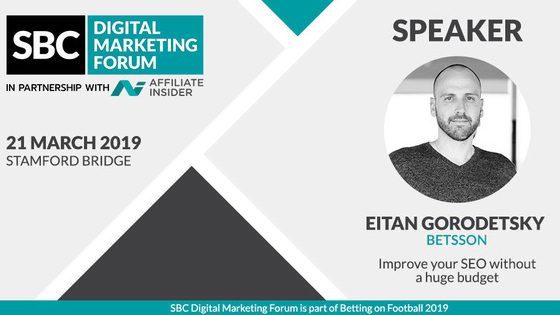Eitan Gorodetsky shares SEO insights ahead of Digital Marketing Forum

Ahead of the Digital Marketing Forum at next week’s SBC Betting on Football conference, AffiliateINISDER caught up with Eitan Gorodetsky, Head of SEO and PPC at Betsson Group. Alongside Rob Kerry, Gorodetsky will be hosting an interesting panel discussion on SEO and how to growth hack without a big budget.
Affiverse: Hi Eitan, can you begin by telling us a bit about your igaming expertise and your history in SEO.
Eitan Gorodetsky: I started searching for things online when I was 12 years-old. I used an American BBS (Bulletin Board System, 1994) where I could connect with the world and created my own database. This made me really good at searching and solving online challenges.
Fast-forward to after my military service and my years at the university, I tried to keep away from the computer, but it kept pulling me back. I started working in lead generation, managing a massive portfolio. This taught me how to scale SEO operations. I started within the igaming industry in 2014, when I was lucky enough to work for 888 Holdings under some great leaders. I then moved on to Catena Media when they were in the startup phase and was part of the growth phase into the affiliate network they are today. Today I’m a proud Betssonite, leading the most talented team I’ve ever worked with – they are my pride and joy.
AI: Where do you think SEO is headed in 2019 and beyond in the sports betting space?
EG: 4 words: speed, personalisation, expertise and scale (aka SPES).
To win the SEO game for sports betting, you must dominate the main keywords and also the long tails. More importantly, you must dominate the phrases that no one has asked yet.
Every match and every event brings with it new keywords and phrases to Google. Who will rank for something that has never been asked before? The SPES winners.
AI: What will delegates be able to do with the information you will be sharing with them at #DigitalMarketingForum?
EG: My idea is to give further info about the SPES model and how to use it. I believe that #DigitalMarketingForum attendees will already be in a position to start applying the model on a small scale and take it from there. My most important advice is “embrace failure” and “start small”.
You can also start experimenting with the SPES model now and get your questions to the forum:
Speed – meaning a fast product. Our users move fast and expect a fast experience. Speed is also about how fast you can get content out to your target audience around the event, then update that content constantly. As you’re getting closer to the event, updates should be coming in by the minute.
Personalisation – Sport betting is made for sports fans! Fans are people that are driven by certain emotions, like loving a team since childhood or following a player that is noble. Personalise the content itself as well as the content experience and where you publish it.
Expertise – People that write about sports must be actual experts. Not self-proclaimed experts. That’s one side. On the other side there are the micro-influencers. These may come from unexpected places; for example a high school soccer coach that gives a prediction on a local team, a mental sports coach who can explain the mental strain of playing, etc. The possibilities are endless.
Scale – Scale is not an option in sports betting. It is a must. Scale provides the ability to reach more clients, but more importantly big data means big insights and a faster process for feedback, testing and implementation thanks to a better overview.
AI: Can you share a few key points on your workshop panel discussion and what our delegates will be able to learn during your session?
EG: I will talk mainly about the SPES model and go through why the current sites are where they are in my view. I’m also a massive fan of operations and strong foundations; to be able to act and scale, the basic knowledge and measurements must be in place and then constantly improved.
AI: The advancement of AI – how is this impacting SEO right now and how can small companies get behind this to be more agile and take advantage of niche opportunities?
EG: I would say there is a difference between AI and ML (machine learning). Today we mainly use ML in order to gather insights from big data and implement changes fast or even in an automated manner. AI is still in its early days when it comes to being effective in writing content that provides value.
Small companies should look into automation more in order to scale operations and increase reach. Once they will reach a certain degree of automation, a ML layer can be incorporated in order to drive execution, such as GEO expansion.
If you haven’t yet booked your ticket to see Gorodestky and the rest of our digital marketing experts, you can do so here.






